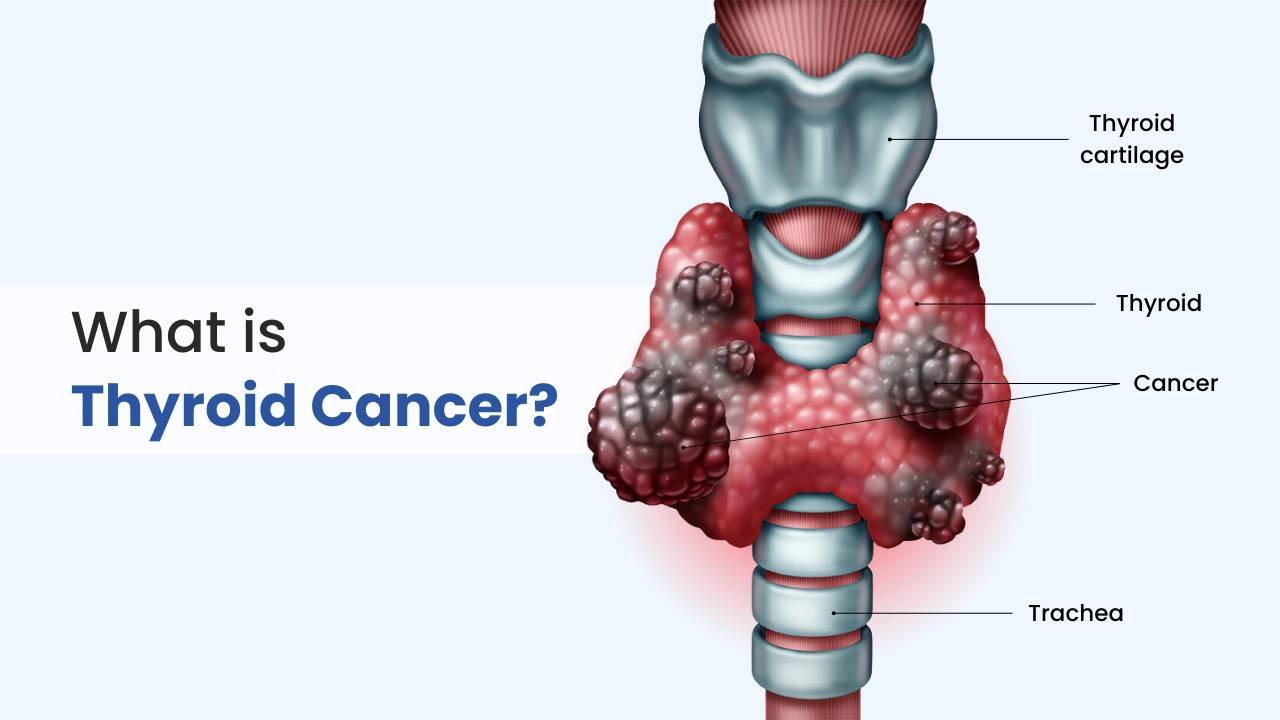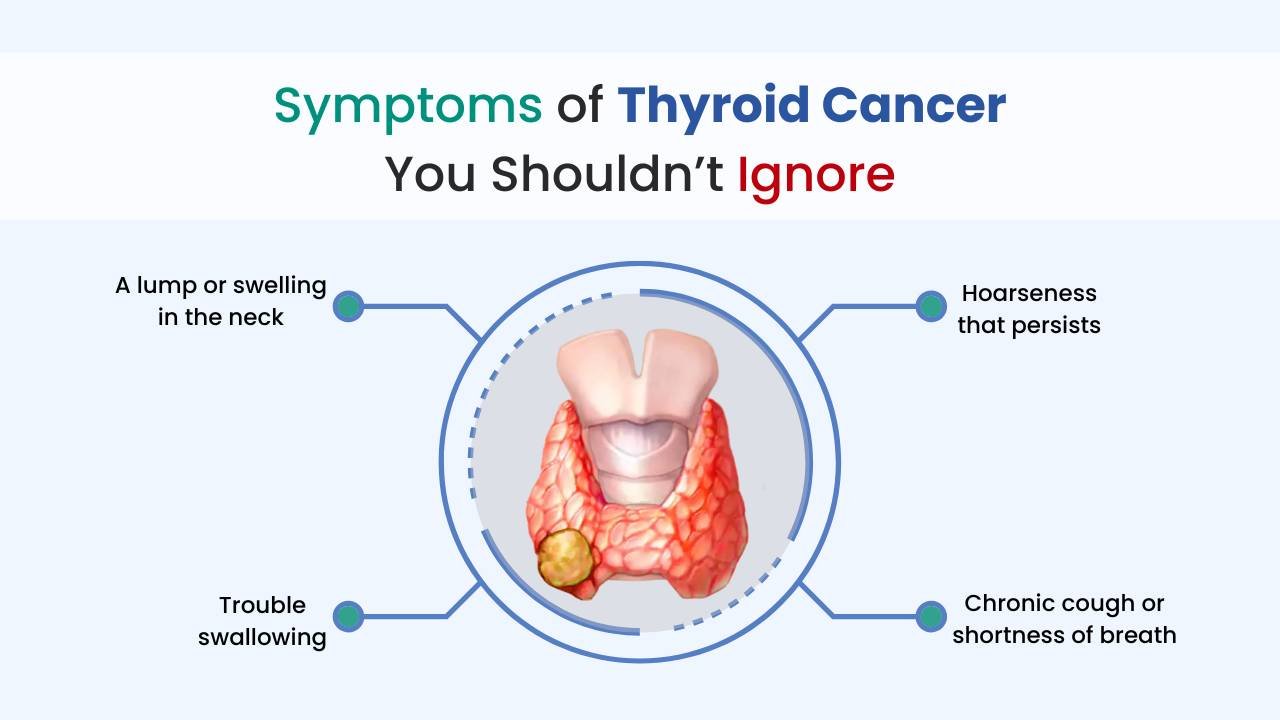Home Blogs Surgical Oncology Top 10 Thyroid Cancer Symptoms You Shouldn’t Ignore

The top 10 thyroid cancer symptoms you shouldn’t ignore include a visible lump in the neck, swallowing issues, Chronic cough or shortness of breath, hoarseness, neck pain, etc., and these symptoms often occur as the cancer symptoms. However, early diagnosis helps to improve the treatment success, so you shouldn’t have to ignore these warning signs and consult with your doctor.
Having thyroid cancer doesn't cause any symptoms at the early stage, but there are some symptoms that you must pay attention to.
Symptoms such as throat pain, swallowing issues, neck pain, and voice changes are the major signs of thyroid cancer that you must be aware of, and you should consult with the doctor immediately.
However, early detection plays an important role in providing successful results, which makes it an important point to be aware of the early signs and symptoms of thyroid cancer.
Here in this article, we will explore the early signs and symptoms of thyroid cancer that you shouldn’t ignore.

Thyroid cancer is an abnormal growth of cells that form in the thyroid, which is a butterfly-shaped gland that is located at the base of the neck. Additionally, it produces the hormones that regulate heart rate, blood pressure, and weight.
However, at the start, thyroid cancer may not cause any symptoms, but when it grows, it causes symptoms like neck swelling, voice changes, and difficulty swallowing.
There are different kinds of thyroid cancer, and while most grow slowly, some can be more aggressive. The good news is that many of these cancers can be treated successfully.
Also Read: Thyroid Surgery cost in India
We don’t fully understand why some cells in the thyroid turn cancerous and start to grow uncontrollably. However, there are a few factors that might increase the risk of developing thyroid cancer. These include things like exposure to radiation, a diet that doesn’t have enough iodine, and certain genetic factors that can run in families.

A lump or bump that you can feel or see on the underside of your neck can be a common sign of thyroid cancer. However, not all lumps are cancerous. A recent study shows that people over 60 have some types of thyroid nodules, and only a small number of them turn out to be cancerous.
Sometimes a tumor in the back of the thyroid presses on the esophagus, and then the swallowing process is difficult for some people, which feels like something is stuck in their throat. However, there are foods like bread and meat that are difficult to swallow due to the pressure.
Temporary voice changes are usually isn’t a cause of issue, but if it becomes very hoarse or breathy for no reason, then there must be a large tumor that is affecting your vocal cords.
In some rare conditions, a large tumor can grow that presses esophagus and cause shortness of breath or a chronic cough. However, it can also be a sign of having a more aggressive form of thyroid cancer.
Note: Talk to your healthcare provider if you experience any of these symptoms as soon as possible.
Here are some following symptoms and signs of thyroid cancer which include:
Cancer that has spread the areas outside the developed area is known as metastasis. However, the doctor may see signs of whether the cancer has spread or not by using scans during the diagnosis of thyroid cancer, such as:
For advanced thyroid cancer, patients may experience:
Thyroid cancer can show similar symptoms in both men and women. However, recent research indicates that women are more likely to be diagnosed with a type of thyroid cancer called papillary thyroid cancer compared to men. However, doctors have found no significant differences between men and women when it comes to small cases of this type of cancer.
Furthermore, researchers have found that females are more likely to get medical care as compared to males because it can cause health symptoms such as fatigue and menstrual disturbance.
Also Read: What is ENT
In the early stages of papillary thyroid cancer, most people don’t notice any signs that something might be wrong. However, some individuals might experience certain symptoms, which can include:
There are different treatment options available depending on the size of the tumor and whether the cancer has spread or not.
It's the most common treatment option for thyroid cancer, which depends on the tumor’s size and location. In a surgical approach, a surgeon may remove a part of your thyroid gland or all of the gland, and the surgeon also removes any nearby lymph nodes where cancer cells have spread.
This treatment approach, radioactive iodine I-131, involves taking a pill or liquid iodine to treat hyperthyroidism and certain types of thyroid cancer. However, this procedure is also known as radioactive iodine therapy.
Radiation therapy is a treatment that focuses on killing cancer cells and preventing them from growing. One type of this treatment, called external radiation therapy, uses a machine to direct a powerful energy beam right at the tumor. This helps target the cancer more precisely.
Chemotherapy is a treatment that uses strong medicines to target and destroy the fastest-growing cancer cells in the body. While it's the most common way to treat cancer, it's important to understand that these cancer cells grow and multiply much quicker than normal cells.
This treatment approach aims to block the release of hormones that can cause cancer to spread.

In some cases, thyroid cancer can not be prevented, but most people get it for an unknown reason. But there are a few things you can do to prevent the risk of thyroid cancer.
Note: If someone in your family has had thyroid cancer, you might want to discuss with your doctor whether there could be a genetic link.
FAQs
The cost of thyroid cancer starts from 3,300 USD to 4,000 USD.
It's a type of cancer that develops when the cells in the thyroid gland begin to grow out of control and cause issues.
There are early symptoms of thyroid cancer, which include a lump, changes in voice, trouble swallowing, swollen lymph nodes, and pain in the neck and throat
A person may have thyroid cancer for a long time without causing any symptoms; however, it depends on various factors like the stage and type of cancer.
Well, symptoms of thyroid cancer might be the same in both males and females, yet the size of the tumor might be larger in men as compared to women.
Yes, thyroid cancer can be cured properly, especially when it's diagnosed and treated early.
Yes, it can come back even after successful treatment.
Yes, thyroid cancer can occur without any symptoms, especially in early stages.

Written By
I'm a content writer at Mejocare.com, where I create easy-to-understand and informative healthcare content. With 4+ years of experience, I help people learn about important health topics and connect with healthcare providers through clear and engaging writing.
I focus on making complex medical information simple and useful, ensuring that readers can easily find the answers they need.
What I do:
I’m committed to helping Mejocare share reliable health information with its readers.
SOURCE
HISTORY
At Mejocare, we prioritize accuracy and reliability. Our content is based on peer-reviewed studies, academic research, and medical associations. We avoid tertiary references. Learn more in our editorial policy. Trustworthy health information for you.
https://www.aarp.org/health/conditions-treatments/thyroid-cancer-signs/ para no 3,4,5,6 https://www.healzone.co.in/blog-details/thyroid-cancer-symptoms-early-warning-signs-you-shouldn-t-ignore para no 1,9,10 https://my.clevelandclinic.org/health/diseases/12210-thyroid-cancer para no 6,8 https://www.cityofhope.org/clinical-program/thyroid-cancer/symptoms para no 3 https://www.cancer.org/cancer/types/thyroid-cancer/detection-diagnosis-staging/signs-symptoms.html para no 1 https://www.medicalnewstoday.com/articles/thyroid-cancer-symptoms-in-females#females-vs-males para no 5 https://www.aurorahealthcare.org/services/cancer/thyroid-cancer/papillary-thyroid-cancer-symptoms-treatment para no 3
CURRENT VERSION
Our care team can help you.
